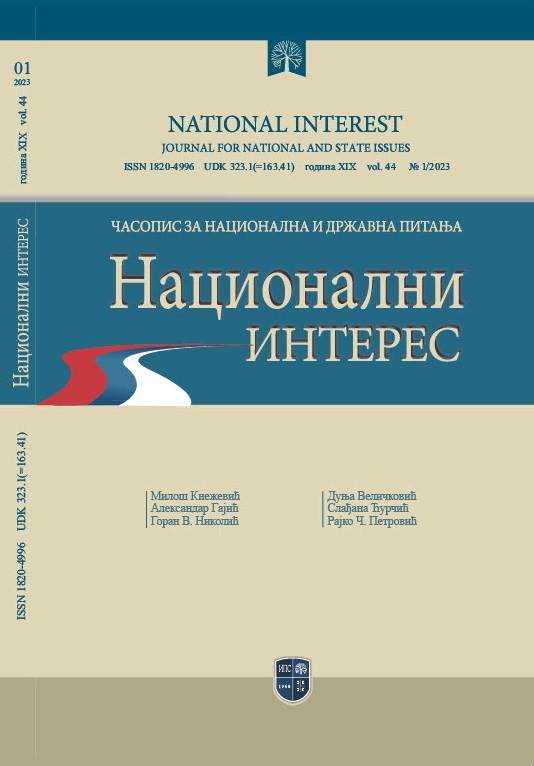КATECHON AND THE "RIGHT SIDE OF HISTORY"
Abstract
The paper confronts two views on historical trends and the self-perception of their leading subjects - that of modern progressivism, whose contemporary bearer is the USA with preconceived notion of its "exceptionalism", and the Russian role of a "restraining power" - Katechon. The first part of the Paper explains the secular, progressive worldview as the core of "American exceptionalism" and its conviction that it is on the "right side of history." The phrase "being on the right side of history", which grew out of this view, has been a commonplace in contemporary political polemics for decades, used by those who consider themselves "enlightened" and "progressive" in order to disqualify or condemn political opponents who, according to their opposition or disagreement, are on the "wrong side of history", i.e. in historical delusion regarding their position and desired development. The Paper, then, explains the Christian eschatological "optimistic pessimism" in understanding of the meaning of history as a unique and unrepeatable process, and, from it, gives explanation of the concept of the Katechon, the "power that restrains" and postpones its Eschaton. The biblical support for this belief is found in the Apostle Paul's "Second Epistle to the Thessalonians" and his words addressed to the Christians there, in which he explains that the second coming of Christ will not happen before the apostasy occurs, which will enable and invite the arrival of the "son of perdition", the Antichrist. His arrival is also historically conditioned, because the apostle prophesied: "And now you know what is keeping him from appearing until his time." (II Thessalonians, chapter 2,6). In this sense, the historical origin and development of the idea of Russia as the "third Rome" is investigated which, by transferring the empire (translatio imperii) as a defender of orthodoxy, became the historical bearer of the imperial ideal and designation of the Katechon. The realization and deviation from this ideal is followed throughout Russian history from the time of the "third Rome" through the "third International" to the contemporary moment of a kind of Third World War. The final part of the Paper analyzes the contemporary situation in Russia in relation to the reawakening of its historical ideal in the difficult, forced circumstances of a renewed confrontation with the globalist "collective West".
Contemporary historical processes have led to a new confrontation of two conflicting views on historical trends, the nature of its subjects and the value frameworks of the lives of individuals and societies: one declining and self-destructive (globalist liberalism), and the other, persistent and opposing, which resurrects and sprouts from its historical roots (Russian Christian Katechon, "Third Rome"). Both of them look at history as an irreversible, unified process, but with a completely different valuation. Although not yet built in accordance with its historical role and katechon ideals, Russia, it turns out, has not only inexhaustible resources, sufficient scientific potential and national self-awareness, as well as a clear national character based on cultural heritage, a key geopolitical position in the old world (the position of the "Heartland"), but also the predominant affection of the non-Western parts of the world that yearns for the establishment of a fairer multipolar international system. The Katechon spiritual upgrade as basis of a model for the creation of a different, more just society in Russia is still in its infancy, but there is no doubt that the circumstances of the comprehensive struggle with the forces of the "collective West" invoke for it.
References
Балабан, Милован. 2022. „Русија-задржавање тајне безакоња?“ Чудо. 30. новембар 2022. Последњи приступ 28. јануар 2023. https://www.cudo.rs/%d0%bc%d0%b8%d0%bb%d0%be%d0%b2%d0%b0%d0%bd%d0%b1%d0%b0%d0%bb%d0%b0%d0%b1%d0%b0%d0%bd%d1%80%d1%83%d1%81%d0%b8%d1%98%d0%b0%d0%b7%d0%b0%d0%b4%d1%80%d0%b6%d0%b0%d0%b2%d0%b0%d1%9a%d0%b5/.
Берђајев, Николај. 1989. Извор и смисао руског комунизма. Београд: Књижевне новине.
Гајић, Александар. 2019. Америка и Рим – империјалне паралеле. Београд: Катена Мунди и ИЕС.
Гајић, Александар. 2021. Демократије не ратују. Београд: ИЕС.
Гајић, Александар. 2012. Идеја светске државе. Београд: Правни факултет у Београду.
Гајић, Александар. 2015. У вртлогу транзиције. Београд: ИЕС.
Гајић, Александар. 2017. „Џозеф Нај и спорне димензије руске моћи.” Национални интерес, 28 (1): 121-139. doi: 10.22182/ni.2812017.6.
Гојковић, Ранко. 2021. „Русија је срушила седам „империја зла.“ Нови Стандард. 24. април. Последњи приступ 27. јануар 2022. https://standard.rs/2021/04/24/ranko-gojkovic-ruska-civilizacija-dobra-je-nepobediva-sila/.
Дугин, Александар. 2023. „Поредак Катехона.“ Нови Стандард, 05. јануар 2023. Последњи приступ 28. јануар 2023. https://standard.rs/2023/01/05/poredak-katehona/.
Нарочницка, Наталија. 2008. Русија и Руси у светској историји. Београд: Српска књижевна задруга.
Спутњик. 2022. „Патријарх московски и целе Русије: У доба глобализације и брисања границе између добра и зла Русија има посебну мисију – да помогне човечанству да одгоди апокалиптични крај.“ 25. октобар 2022. Последњи приступ 27. јануар 2023. http://www.nspm.rs/hronika/patrijarh-moskovski-i-cele-rusije-kiril-u-doba-globalizacije-i-brisanja-granica-izmedju-dobra-i-zla-rusija-ima-posebnu-misiju-%E2%80%93-da-pomogne-covecanstvu-da-odgodi-apokalipticni-kraj.html?alphabet=l.
Суботић, Милан. 2013. Руске теме: месијанство, интелигенција, нација. Београд: Логос.
Сурков, Владислав. 2019. „Путинизам је облик руске државности за 21. век.“ Нови Стандард. 13. фебруар 2019. Последњи приступ 28. јануар 2023. https://standard.rs/2019/02/13/putinizam-je-oblik-ruske-drzavnosti-za-21-vek/.
Сурков, Владислав. 2018. „Усамљеност полутанке.“ владимиркршљанин.нет. 11. април 2018. Последњи приступ 28. јануар 2023. www.vladimirkrsljanin.net/vladislav-surkov-usamljenost-polutanke-14/.
Танасић, Никола. 2010. „Голгота руског народа и државе.“ Богословље 1-2, 230-250. Доступно на: http://bogoslovlje.pbf.rs/index.php/arhiva/95-2010/bogoslovlje-1-2-2010/138-golgota-
Флоровски, Георгије. 1991. Метафизички предуслови утопизма. Београд: Модерна.
Фуко, Мишел. 1988. Археологија знања. Београд: Плато.
Фукујама, Френсис. 2002. Крај историје и последњи човек. Подгорица: ЦИД
Чворовић, Зоран. 2022. „Русија као катехон.“ Нови Стандард, 29. март 2022. Последњи приступ 28. јануар 2023. https://standard.rs/2022/03/29/rusija-kao-katehon/.
Engleman, Dennis Eugene. 1995. Ultimate Things: An Orthodox Christian Perspective on the End Times, Chesterton: Conciliar Press.
Lipset, Seymor Martin. 1996. American Exeptionalism: Double Edge Sword. New York: Norton & Company.
Shapiro, Ben. 2019. The Right Side of History. Los Angeles: California State University.
Talmond, Jаcob. 1955. The Origins of Totalitarian Democracy, London: Norton &co.

